The future of India-Mexico relations
Karen Woodin-Rodriguez interviewed Jaime Nualart, Ambassador of Mexico to India, to discuss Indo-Mexican relations and the rapidly growing bilateral trade and investment between the two countries.
Karen Woodin-Rodriguez interviewed Jaime Nualart, Ambassador of Mexico to India, to discuss Indo-Mexican relations and the rapidly growing bilateral trade and investment between the two countries.
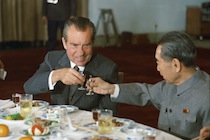 Courtesy: White House Photographer/Wikimedia Commons
Courtesy: White House Photographer/Wikimedia Commons
Forty years ago, former President of the United States Richard Nixon made a visit to China that has perhaps changed the whole gamut of U.S.-China relations. In the following years, China witnessed the rise of a significant middle class and became the world's second largest economy.
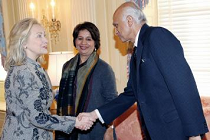 Courtesy: Indian Embassy
Courtesy: Indian Embassy
Iran may become a litmus test for India's relationship with the U.S., where New Delhi must deftly balance its strategic relationship with the U.S. along with its energy interests in Iran.
 Courtesy:
Courtesy:
Ambassador Kanwal Sibal reviews "That Used To Be US", by Thomas L. Friedman and Michael Mandelbaum, and summarizes that it is an unpretentious book which explains the problems facing the US – heavily marked by a journalistic style that relies extensively on quotations.
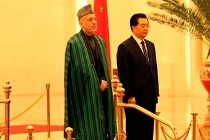 Courtesy: Afghanistan Goverment/WikimediaCommons
Courtesy: Afghanistan Goverment/WikimediaCommons
Afghanistan has become the first significant theatre of effective confrontation between the West and China. But with its deep-rooted economic ties, could the U.S. and NATO actually confront China?
India and Japan have designed their collaborations over the years to be a win-win for both sides. Now, they are willing to collaborate on long-term initiatives, based on intrinsic factors of inter-dependent competencies – rather than on the defence of an extrinsic threat of a common enemy.
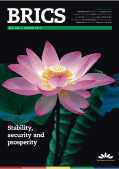 Courtesy: Newsdesk
Courtesy: Newsdesk
Alongside the 2012 BRICS Summit in Delhi, this special publication is a collection of articles that addresses important issues of the global agenda, the priorities of BRICS, the policies and competitive advantages of the participants, as well as BRICS institutionalization.
 Courtesy: nazeah/Wikimediacommons - Ramesh Lalwani/Flickr
Courtesy: nazeah/Wikimediacommons - Ramesh Lalwani/Flickr
The year 2011 saw various events - the Arab Spring, anti- corruption protests, Europe's sovereign debt crisis - transform countries and reshape the world order. Gateway House takes a look at what these events mean for India, and presents India's top foreign policy cheers and jeers for the year.
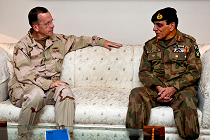 Courtesy: U.S.ArmedForces/WikimediaCommons
Courtesy: U.S.ArmedForces/WikimediaCommons
The 'memogate' fiasco in Pakistan highlights, yet again, the tensions that exist between the country’s political establishment and the Pakistan Army. While the final acts of this maneuvering are being played out, will the all-powerful Army continue to push the civilian government into a corner?

Amidst myriad country groupings that already exist – BRICS, IBSA, APEC, SCO and many others – a new initiative in the Pacific is looking to integrate more powerful countries to form a multilateral free trade agreement – the Trans Pacific Partnership. How important is this towards the reshaping of trade and power?